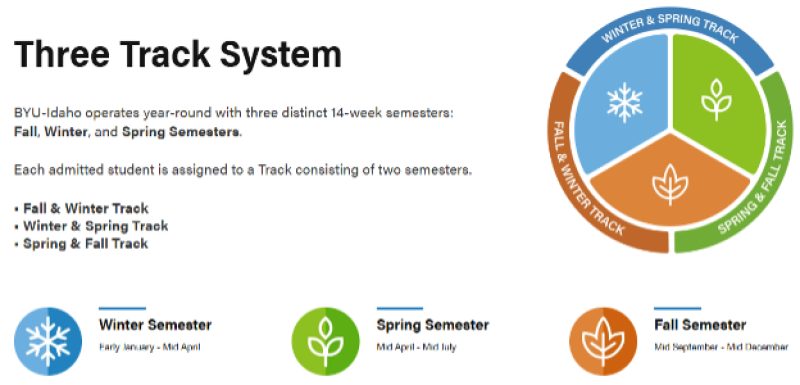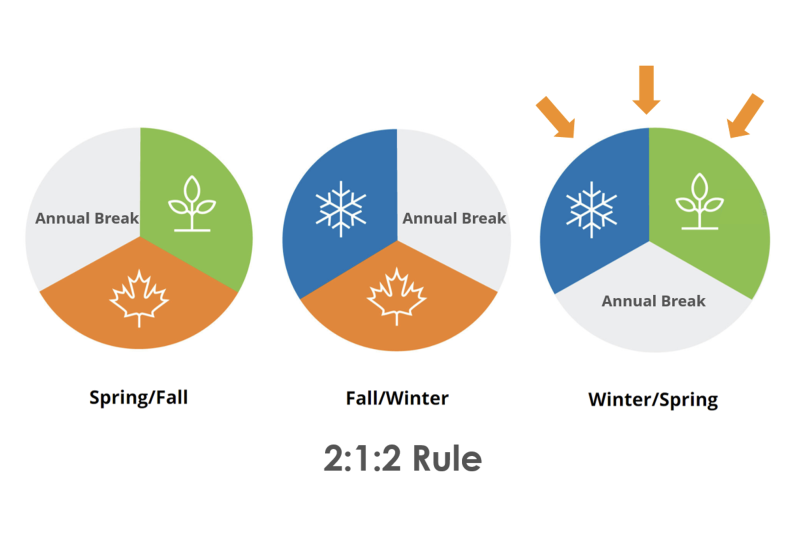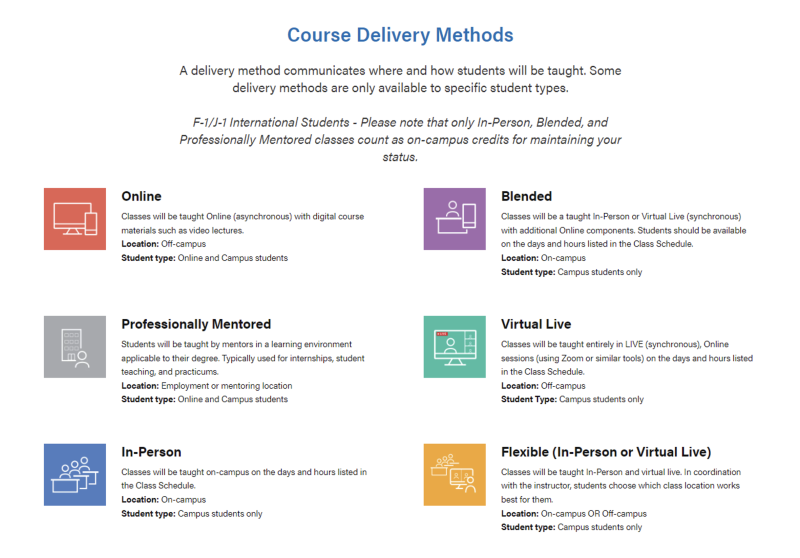Maintaining F-1 Visa Status
Immigration regulations define a “full course of study” as 12 credits.
Full Course of Study at BYU-Idaho
BYU-Idaho offers full semester classes three times per year. Students are assigned a “track” which includes two of the three semesters. Students are permitted to register for classes during any of these semesters. In addition, students may also take classes during the Summer Session, though this is not required for maintaining F-1 status.

New students in Initial status are assigned the track that corresponds to their first two semesters on campus – this ensures compliance with the requirement that students complete a full academic year prior to taking a break.
For determining when you are required to be enrolled in a full course of study, as well as considering requests for an annual break, refer to the 2:1:2 rule depicted below:

The twos refer to the minimum number of fully enrolled semesters before and after the break, represented by the one. An annual break must always be preceded and followed by two semesters of full enrollment.
Delivery Methods and Online Credits
The graphic below shows the Delivery Methods offered at BYU-Idaho and their classification as on-campus or online for purpose of calculating a full course load.

International students are allowed to count up to 3 credits of online (off-campus) courses toward the 12 credit minimum.
Students who are not properly enrolled in a full course of study will receive warnings from International Services. Students facing any obstacles to registering for classes should reach out to International Services as early as possible.
Exceptions
- Students that are eligible for a Reduced Course Load
- If you are concerned about your ability to take a full load of classes, please read the Medical Reduced Course Loads (PDF) for more information. We also recommend contacting International Services to schedule an appointment with an adviser.
- Students that apply for and are approved for Curricular Practical Training (CPT) for a full-time internship that is required for their major.
- Students who are in their final semester of study and have less than 12 credits required to complete their program.
- Must submit either the Last Semester Request or OPT Request so that graduation can be verified and authorization provided to register for less than 12 credits.
- *If you only need to be registered in one course to complete your degree program during your final term, it must be in-person (can’t be online).
Unofficial Withdrawal (UW)
Definition: “UW” represents an unofficial withdrawal which is given to a student who meets the following criteria: Did not complete proper withdrawal procedures; has record of non-attendance that began before the last date to withdraw from individual courses without grade earned; and did not complete any work, tests, or class-related assignments after attendance ceased. The “UW” is calculated into the GPA as a failing grade value (see the BYU-Idaho Academic Catalog for more information).
Any UW is cause for concern and will trigger outreach from International Services. Beginning with the Spring 2025 Semester, receiving a UW for all classes in a given semester will be considered a violation of status and the student’s I-20 will be terminated for Unauthorized Withdrawal.
Academic Progress
Another important element in maintaining your visa status is to make “normal progress toward completing a course of study.”1 A pattern of poor performance can place your status at risk.
How is Academic Progress Tracked and Managed?
The University’s standard for graduation eligibility is a 2.0 GPA. International Services uses this standard when evaluating international student academic performance each semester. Our tiered approach consists of the following interventions:
- Warning – the first semester that a student earns less than a 2.0 GPA. Student receives a written warning with an invitation to meet with a DSO. This warning is followed by an invitation from Academic Advising to review available resources and create a plan for success. If a student meets the standard the following semester, he/she is removed from this tier.
- Probation – the second consecutive semester that a student earns less than a 2.0 GPA. Student receives a written notification that his/her immigration status is in jeopardy. The student is required to meet with a DSO to review options. Those options include transferring to another school or achieving at least a 2.0 semester GPA with no failed classes. Strong encouragement is provided to utilize campus resources to turn things around. Students remain on probation until they meet the standard for at least three consecutive semesters AND raise their cumulative GPA above 2.0.
- Termination – a student on probation who fails to meet the 2.0 semester GPA/no Fs requirement. A mid-semester intervention for students not performing well in their classes will ensure the expectation and potential consequences are clearly understood. If a Transfer Out Request has not been received, the student’s I-20 may be terminated after grades post, depending on a full review of past performance. International Services retains the right to exercise discretion if circumstances provide any of the following:
- Demonstrated improvement toward the standard -OR-
- Evidence that issues affecting performance have been resolved and reasonable expectation for immediate improvement -AND-
- Student has enough time prior to program end date to either complete program or establish a pattern of success
We Are Here to Help
- International Services and Academic Advising will work closely together to identify students in need of intervention, align communication, and mutually reinforce expectations.
- This academic standard is presented to new students during orientation.
- International Services proactively monitors grades during the semester and will make additional proactive outreach as needed.
Maintaining Valid Immigration Documents
I-20: International students must be aware of the expiration date on their I-20. If students cannot complete their degree by the expiration date on their I-20, students must request a program extension before the expiration date on the I-20. Students who do not request a program extension on time will be considered out of status.
Change of Local Address (for SEVIS)
As stated on the I-20, international students are required to maintain a U.S. address at all times while in the U.S. and report any change in address within 10 days of moving. This will happen automatically for students who live in approved campus housing. Students who do not live in approved campus housing, or who move away from campus while not enrolled in classes, must submit an address change through Sunapsis.
Verify your U.S. address at anytime by visiting iStart. If the address displayed is correct, there is no need to submit the form.
Students must enter their address in the correct format for their information to be updated in SEVIS. Here are some tips on entering your address in the correct format:
- The “Street Address” field can only contain street number and street name (Example: 325 N 1st W)
- The “Apartment, Suite, Etc.” field can only contain the unit number, applicable to those students living in an apartment complex or multi-unit housing (Example: Apt 10 or Unit 5). If you live in a house, leave this field blank.
- The “Zip/Postal Code” field must be properly filled out with five digits and the additional four digits at the end are unnecessary and can be omitted.
- Please enter the city’s name and zip code accurately (Example: Rexburg 83440)
- If you are unsure of any part of your local U.S. address, such as the street name, city name, and zip code, please utilize Google Maps for address verification and accuracy
Renewing Passport
All non-immigrants in the U.S. are required to maintain a valid passport at all times. Passports should be valid for at least six months into the future when entering and re-entering the U.S. and also when applying for a visa. Students/scholars must contact their local embassy or consulate for instructions on renewing their passport. This requirement doesn’t apply to Canadian nationals.
Students/scholars whose expired passport has a valid visa are still able to use that visa if they have the old passport. Students/scholars must remember to carry and present the old passport along with the new passport when traveling.
Renewing F/J Visa
Students/scholars may stay in the U.S. on an expired F-1/J-1 visa as long as they maintain their immigration status by being in possession of a valid I-20/DS-2019 and an I-94 Arrival/Departure record. If students/scholars are traveling and will not use automatic revalidation (see below) to re-enter the U.S., they must have a valid visa.
Visas cannot be renewed inside the U.S. Once students/scholars have made a visa interview appointment at a U.S. embassy/consulate abroad, they should review the embassy/consulate’s website for details on the visa renewal process including required documents. Students/scholars are also able to check on the visa wait times for a specific U.S. embassy/consulate through the U.S. Department of State website.
Given the high demand for appointments at most U.S. consulates and embassies, schedule your appointment as soon as possible. Check with the consulate or embassy where you will complete your visa renewal to confirm document requirements. Certain applicants may qualify for a waiver of the in-person interview, and the consulate will confirm whether you meet the specific criteria for an interview waiver.
The Department of State recommends that students apply for a visa in their home country. Students/scholars who must apply for a visa in a third country must remember the following:
- Students/scholars cannot return to the U.S. until their visa has been issued.
- If a background check is required, students/scholars must wait until this is cleared and the wait could be several weeks.
- If the visa application is denied, students/scholars will not be able to return to the U.S. and will be required to return to their home country.
- If the visa application is denied in Canada or Mexico, Automatic Revalidation (see below) does not apply.
- Students/scholars who plan to renew their visa in Mexico should review OIS’ guidelines on the visa renewal process in Mexico.
Automatic Revalidation
Automatic Revalidation provides that, under certain circumstances, a person with an expired F and J visa in their passport can re-enter the US from Canada, Mexico and “adjacent islands” (except Cuba) with an expired non-immigrant visa. The absence outside the US cannot exceed 30 days and the I-94 Arrival/Departure record must remain valid.
*Please check the visa requirements for the country to which you are traveling before making travel arrangements. You may require a visa to enter certain countries based on the passport you hold.
To re-enter the US under the benefit of automatic revalidation of visa, students/scholars must meet the following requirements:
- Have traveled ONLY to Canada, Mexico or adjacent islands
- The absence cannot exceed 30 days
- Students CANNOT apply for a new US non-immigrant visa during this time
- Has maintained and intends to maintain non-immigrant status in the US
- Carry valid passport with an expired visa, I-20/ DS-2019 with valid travel signature
*IMPORTANT: Students/ Scholars should retain and be in possession of a printout of their I-94 Arrival/Departure record when leaving the US to ensure successful re-entry to the U.S.
Citizens of Iraq, Iran, Syria, Libya, Sudan, North Korea, and Cuba are not eligible for the automatic revalidation benefit and would be required to have a valid visa for re-entry.
Students/scholars who are traveling to Mexico or the Caribbean by cruise ship must contact the cruise line before purchasing the cruise package to confirm they will recognize automatic revalidation and allow them to travel outside the US without a valid F-1/ J-1 visa.
The adjacent islands include:
Saint Pierre, Miquelon, the Dominican Republic, Haiti, Bermuda, the Bahamas, Barbados, Jamaica, the Windward and Leeward Islands, Trinidad, Martinique, and other British, French, and Netherlands territory or possessions in or bordering on the Caribbean Sea [Reference INA, Section 101(b)(5)]
Please read the information provided on the U.S. Department of State website.
Regaining F-1 Status
Students who fail to maintain their F-1 status are considered out of status. If they wish to continue their education at BYU-Idaho as an F-1 student, they must correct their status. Please refer to the information provided on Study in the States and contact International Services if you need assistance.